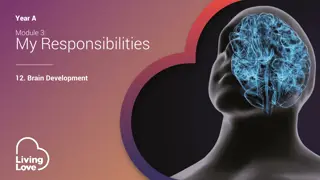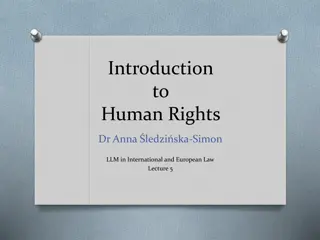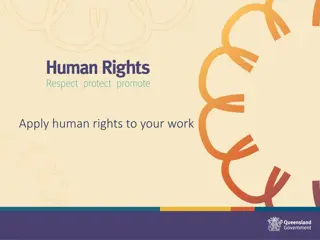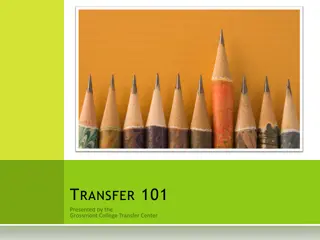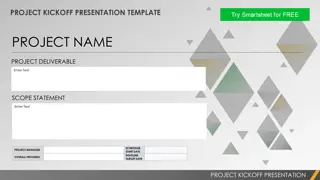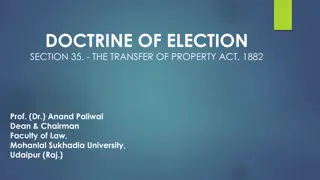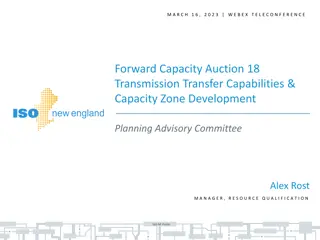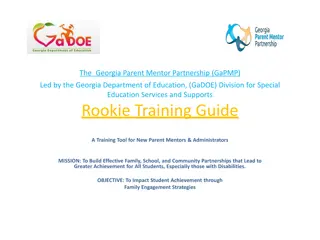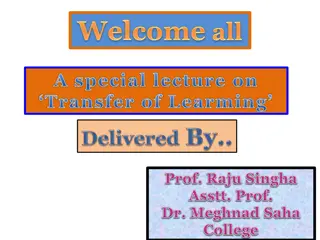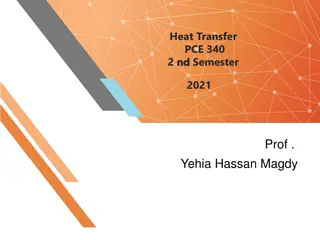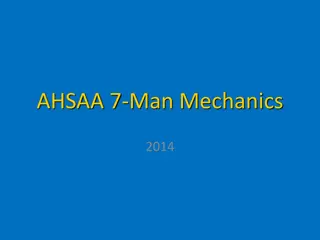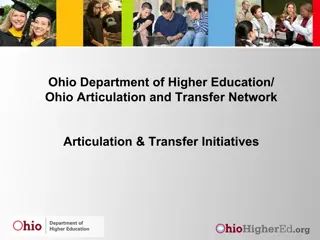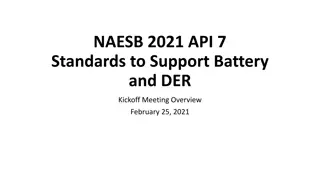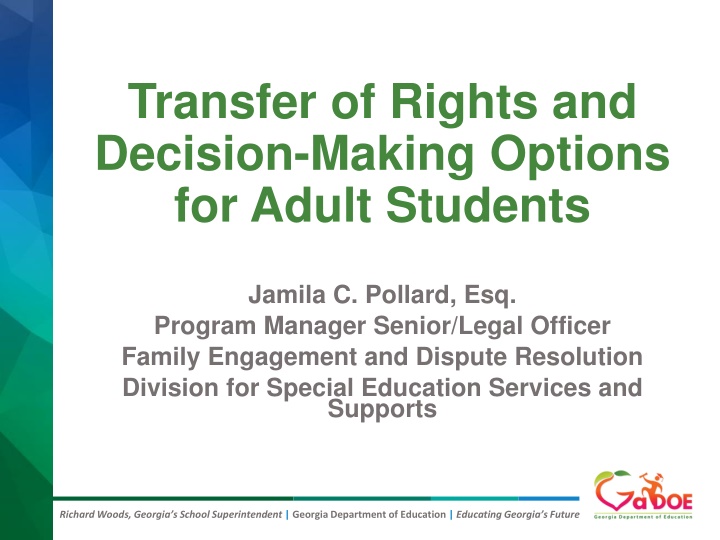
Transfer of Rights and Decision-Making Options for Adult Students
Explore the provisions under IDEA for transfer of rights to adult students, notification requirements, and decision-making options for students with disabilities reaching the age of majority. Gain insights on ensuring a smooth transition and empowering students in educational matters.
Download Presentation

Please find below an Image/Link to download the presentation.
The content on the website is provided AS IS for your information and personal use only. It may not be sold, licensed, or shared on other websites without obtaining consent from the author. If you encounter any issues during the download, it is possible that the publisher has removed the file from their server.
You are allowed to download the files provided on this website for personal or commercial use, subject to the condition that they are used lawfully. All files are the property of their respective owners.
The content on the website is provided AS IS for your information and personal use only. It may not be sold, licensed, or shared on other websites without obtaining consent from the author.
E N D
Presentation Transcript
Transfer of Rights and Decision-Making Options for Adult Students Jamila C. Pollard, Esq. Program Manager Senior/Legal Officer Family Engagement and Dispute Resolution Division for Special Education Services and Supports Richard Woods, Georgia s School Superintendent | Georgia Department of Education | Educating Georgia s Future
Learning Targets I can explain to parents and students the IDEA s transfer of rights provision. I can explain how to provide proper and timely notification of transfer of rights. I can compare and contrast some decision-making options for students with disabilities who reach the age of majority. Richard Woods, Georgia s School Superintendent | Georgia Department of Education | Educating Georgia s Future
Transfer of Rights Educating Georgia's Future by graduating students who are ready to learn, ready to live, and ready to lead.
Transfer of Rights under IDEA #1 34 C.F.R. 300.520(a) (a) General. A State may provide that, when a child with a disability reaches the age of majority under State law that applies to all children (except for a child with a disability who has been determined to be incompetent under State law) (1)(i) The public agency must provide any notice required by this part to both the child and the parents; and (ii) All rights accorded to parents under Part B of the Act transfer to the child; Richard Woods, Georgia s School Superintendent | Georgia Department of Education | Educating Georgia s Future
Transfer of Rights under IDEA #2 34 C.F.R. 300.520(a) (2) All rights accorded to parents under Part B of the Act transfer to children who are incarcerated in an adult or juvenile, State or local correctional institution; and (3) Whenever a State provides for the transfer of rights under this part pursuant to paragraph (a)(1) or (a)(2) of this section, the agency must notify the child and the parents of the transfer of rights. Richard Woods, Georgia s School Superintendent | Georgia Department of Education | Educating Georgia s Future
Transfer of Rights under IDEA #3 34 C.F.R. 300.520(b) Special Rule. A State must establish procedures for appointing the parent of a child with a disability, or, if the parent is not available, another appropriate individual, to represent the educational interests of the child throughout the period of the child s eligibility under Part B of the Act if, under State law, a child who has reached the age of majority, but has not been determined to be incompetent, can be determined not to have the ability to provide informed consent with respect to the child s educational program. Georgia does not have such law. Richard Woods, Georgia s School Superintendent | Georgia Department of Education | Educating Georgia s Future
Transfer of Rights under IDEA #4 34 C.F.R. 300.320(c) (c) Transfer of rights at age of majority. Beginning not later than one year before the child reaches the age of majority under State law, the IEP must include a statement that the child has been informed of the child's rights under Part B of the Act, if any, that will transfer to the child on reaching the age of majority under 300.520. Richard Woods, Georgia s School Superintendent | Georgia Department of Education | Educating Georgia s Future
Transfer of Rights under Georgia Law #1 Ga. Bd. of Educ. R. 160-4-7-.06 (3) Transfer of Rights at Age of Majority. Beginning not later than one year before the student reaches age 18, the IEP must include a statement that the student has been informed of the student s rights under Part B of the IDEA, if any, which will transfer to the student on reaching age 18. Richard Woods, Georgia s School Superintendent | Georgia Department of Education | Educating Georgia s Future
Transfer of Rights under Georgia Law #2 Ga. Bd. of Educ. R. 160-4-7-.21(2) & (3) Defines age of majority as [t]he age at which, by law, a child assumes responsibilities of an adult. In Georgia, the age of majority is 18. Defines adult student as [a] student with a disability, age 18 or older, to whom rights have transferred under the IDEA 2004 and Georgia Rule. Richard Woods, Georgia s School Superintendent | Georgia Department of Education | Educating Georgia s Future
Transfer of Rights under IDEA 34 C.F.R. 300.625(b)-(c) (b) Under the regulations for Family Educational Rights and Privacy Act (FERPA) in 34 CFR 99.5(a), the rights of parents regarding education records are transferred to the student at age 18. (c) If the rights accorded to parents under Part B of the Act are transferred to a student who reaches the age of majority, consistent with 300.520, the rights regarding educational records in 300.613 through 300.624 must also be transferred to the student. However, the public agency must provide any notice required under section 615 of the Act to the student and the parents. Richard Woods, Georgia s School Superintendent | Georgia Department of Education | Educating Georgia s Future
Which rights are transferring? All rights under IDEA Part B Examples Right to receive notice of and attend IEP Team meetings Right to consent to evaluations/reevaluations Right to make educational decisions including to revoke services Right to utilize dispute resolution processes (e.g., mediation, due process hearing) All rights under FERPA incorporated in IDEA Examples Right to inspect and review education records Right to request amendment of records Right to consent to disclosure of personally identifiable information not meeting FERPA exceptions Richard Woods, Georgia s School Superintendent | Georgia Department of Education | Educating Georgia s Future
What notices must be provided to both the student and parent? Any notice required by Part B of the IDEA, Subpart E Procedural Safeguards Due Process Procedures for Parents and Children (34 C.F.R. 300.500-300.520) Examples Notice of IEP Team meetings (34 C.F.R. 300.501(b)(2)) Prior Written Notice (34 C.F.R. 300.503) Procedural Safeguards Notice (34 C.F.R. 300.504) Richard Woods, Georgia s School Superintendent | Georgia Department of Education | Educating Georgia s Future
How do you provide proper and timely notification? Discuss transfer of rights with the student and parent at least one year before the student reaches 18. Document the discussion Clearly explain the rights to the student Provide to student in writing and explain in a manner the student can understand Provide Prior Written Notice to the student and parent a reasonable time before the student reaches 18 about the upcoming change. The IEP could meet this requirement if all notice requirements under 300.503(b) are met. Richard Woods, Georgia s School Superintendent | Georgia Department of Education | Educating Georgia s Future
Decision-Making Options #1 Offering a holistic education to each and every child in our state.
Decision-Making Options #2 Makes Own Decisions Supported Decision Making* Power of Attorney Advance Directive Guardianship Note: This is not an exhaustive list Richard Woods, Georgia s School Superintendent | Georgia Department of Education | Educating Georgia s Future
Makes Own Decisions All rights under IDEA and FERPA reside with the adult student Adult student can designate parents as members of the IEP Team as individuals who have knowledge or special expertise regarding the [adult student]. See 34 C.F.R. 300.321(a)(6). All other rights under State and Federal law reside with the adult student (e.g., healthcare, finances, residence, occupation) Richard Woods, Georgia s School Superintendent | Georgia Department of Education | Educating Georgia s Future
Power of Attorney #1 A Power of Attorney (POA) is a writing or other record that grants authority to a person to act in the place of an individual. O.C.G.A. 10-6B-2(7). The person granting the authority is the principal and the person who is granted the authority is the agent. A POA can be written to give as little or as much power as the principal wishes. A POA can cover various tasks, such as signing papers, checks, and contracts and buying and selling property. Richard Woods, Georgia s School Superintendent | Georgia Department of Education | Educating Georgia s Future
Power of Attorney #2 A POA is durable unless it expressly provides that it is terminated by the incapacity of the principal. O.C.G.A. 10- 6B-4. A POA is executed by the signature of the principal and two witnesses (not the agent). O.C.G.A. 10-6B-5(a). A principal can amend a POA at any time. Richard Woods, Georgia s School Superintendent | Georgia Department of Education | Educating Georgia s Future
Advance Directive for Health Care 1 An advance directive for health care is a written document voluntarily executed to appoint a health care agent to make health care decisions and/or direct the withholding or withdrawal of life saving procedures (e.g., Do Not Resuscitate (DNR) order). See O.C.G.A. 31- 32-2 and 31-32-5. The person executing the directive is the declarant. The health care agent cannot be a physician or health care provider directly involvedin the declarant s health care. Health care includes any care, treatment, service, or procedure to maintain, diagnose, treat, or provide for a declarant s physical or mental health or personal care. O.C.G.A. 31-32-2(5). Richard Woods, Georgia s School Superintendent | Georgia Department of Education | Educating Georgia s Future
Advance Directive for Health Care 2 An advance directive for health care is executed by the signature of the declarant and two witnesses (not the health care agent or directly involved in declarant s health care, but one could be an employee of the health care facility). O.C.G.A. 31-32-5(c). A declarant can amend an advance directive for health care at any time. Richard Woods, Georgia s School Superintendent | Georgia Department of Education | Educating Georgia s Future
Guardianship #1 A court order issued when the court finds the adult lacks sufficient capacity to make or communicate significant responsible decisions concerning his or her health or safety. O.C.G.A. 29-4-1(a). (Probable cause standard) The court appoints a guardian to the adult who is called a ward. No adult shall be presumed to be in need of a guardian unless adjudicated to be in need of a guardian pursuant to this chapter. O.C.G.A. 29- 4-1(e). Richard Woods, Georgia s School Superintendent | Georgia Department of Education | Educating Georgia s Future
Guardianship #2 What rights can be lost with guardianship? Right to marry Right to make, modify, or terminate contracts Right to consent to medical treatment Right to establish a residence or dwelling place Right to change a residence or dwelling place Right to revoke a revocable trust established by the ward Right to bring or defend any action at law or equity, except an action relating to the guardianship. O.C.G.A. 29-4-21(a) and 29-4-23(a). Guardianship can only be modified or terminated by court order. Richard Woods, Georgia s School Superintendent | Georgia Department of Education | Educating Georgia s Future
Guardianship #3 All guardianships shall be designed to encourage the development of maximum self- reliance and independence in the adult and shall be ordered only to the extent necessitated by the adult s actual and adaptive limitations after a determination that less restrictive alternatives to the guardianship are not available or appropriate. O.C.G.A. 29-4- 1(f). Richard Woods, Georgia s School Superintendent | Georgia Department of Education | Educating Georgia s Future
Supported Decision Making #1 A method of developing decision-making skills by relying on supporters to assist a person in collecting information, processing information, and coming to a reasoned decision. Supported decision-making allows individuals with disabilities to make choices about their own lives with support from a team of people. Individuals with disabilities choose people they know and trust to be part of a support network to help with decision-making. From http://supportmydecision.org and http://supporteddecisions.org Richard Woods, Georgia s School Superintendent | Georgia Department of Education | Educating Georgia s Future
Supported Decision Making #2 A written agreement identifying the support the adult needs (e.g., finances, health care, living arrangements, occupation) and who will provide the support (supporters). There is no Georgia law implementing this process/agreement but a person is not prevented from presenting a supported decision making agreement to a court as an informal alternative to guardianship. In a court case in Virginia, Ross et al v. Hatch, during a petition for guardianship, the judge ordered a limited guardianship where the guardians, among other things, assisted the ward in making and implementing decisions through supported decision making. Richard Woods, Georgia s School Superintendent | Georgia Department of Education | Educating Georgia s Future
Learning Targets Can you explain to parents and students the IDEA s transfer of rights provision? Can you explain how to provide proper and timely notification of transfer of rights? Can you compare and contrast some decision making options for students with disabilities who reach the age of majority? Richard Woods, Georgia s School Superintendent | Georgia Department of Education | Educating Georgia s Future
Richard Woods, Georgias School Superintendent | Georgia Department of Education | Educating Georgias Future
Jamila C. Pollard, Esq. jpollard@doe.k12.ga.us (404) 670-2683 www.gadoe.org @georgiadeptofed youtube.com/georgiadeptofed EDUCATING EDUCATING EDUCATING EDUCATING GEORGIA S FUTURE GEORGIA S FUTURE GEORGIA S FUTURE GEORGIA S FUTURE

